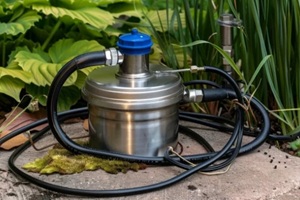
You turn on the tap, and a burst of air spits out before the water runs cloudy, or perhaps you notice a patch of soggy grass near your septic drain field. While these issues may seem minor, they could potentially indicate more significant problems within your water system.
For homeowners who rely on private wells or septic tanks, well and septic inspection in Maryland is the best way to protect your water quality, avoid costly repairs, and stay compliant with relevant state regulations.
This article will outline the early warning signs of a faulty water system so you can act quickly and keep everything flowing smoothly.
The Importance of Well and Septic Inspection in Maryland
More than 420,000 Maryland households depend on private wells or septic systems for their daily water needs. These systems operate outside municipal oversight, meaning homeowners carry full responsibility for water safety and wastewater treatment.
Neglect can lead to serious health risks, property damage, and expensive fines under Chesapeake Bay protection rules. Regular inspections, routine testing, and timely maintenance are essential for keeping water systems in good working order.
Warning Signs Your Well Needs Attention
Your well is a lifeline for your household water supply, and when problems develop, they often begin with subtle signs that are easy to overlook. Thankfully, early intervention protects the pump, prevents contamination, and minimizes the likelihood of costly emergency repairs in the future.
Sputtering Faucets and Blasts of Air
When air spurts from your faucets, it often indicates air leaks or a low water level, which may suggest a failing pump or a damaged drop pipe. Contact a professional to test the pump and static water level.
Unexpected Increase in Electricity Bills
A sudden spike in power usage may indicate that the pump is short-cycling, running continuously to maintain pressure. When this happens, the increased energy use shortens pump life, so it’s important to get the pressure tank and pump controls inspected as soon as possible.
Odd Noises from the Well Pump
Grinding, humming, or loud thuds from the pump typically mean mechanical wear is progressing. Without attention, this can lead to complete pump seizure and a total loss of water supply. Schedule a pump inspection before the issue worsens.
Changes in Water Taste, Smell, or Color
Water that turns metallic, cloudy, or smells like rotten eggs may signal the presence of iron, manganese, hydrogen sulfide, or bacterial contamination. Collect a water sample and submit it to a Maryland Department of the Environment (MDE) certified lab for testing.
Visible Sediment or Rust
Sediment or rust in your water can point to a damaged well screen or a falling water table that stirs up silt. Have the casing and screen inspected and consider installing filtration equipment if needed.
Reduced or Fluctuating Pressure
Drops in water pressure or sudden fluctuations may stem from a failing pressure tank, clogged lines, or a lowered water column. A pressure test and servicing of the tank can restore normal flow.
Damaged or Loose Well Cap

When the well cap or casing becomes damaged, insects, small animals, and surface runoff can enter the well, introducing bacteria into the water. Replace the cap promptly and keep it at least six inches above ground level.
Flooding or Nearby Construction
Heavy flooding or construction within 100 feet of the well can allow surface contaminants to infiltrate the groundwater. Shock chlorinate the system and retest water quality after such events.
Family Members Reporting Stomach Issues
Stomach illnesses among household members may signal bacterial or nitrate contamination in your water supply. Arrange for immediate bacterial and nitrate testing through a certified lab.
Aging Wells Without Inspections
Wells older than 20 to 30 years or those without inspection records for three or more years carry a higher risk of component corrosion and outdated standards. Book a complete well audit to evaluate system health.
Warning Signs Your Septic System Needs Attention
Septic systems quietly process wastewater underground, but they can fail if they don’t receive regular care. When issues arise, the signs often surface around your home or yard. Addressing these early symptoms helps avoid sewage backups and contamination.
Slow Drains and Gurgling Pipes
Frequent plunging, slow-draining sinks, or gurgling noises hint at a saturated drainfield or clogged line. Try to arrange a camera inspection and pump the tank if necessary.
Indoor Sewage Backup
Water or sewage backing up into the home indicates a hydraulic overload or even a blocked outlet. Call a licensed septic professional immediately to prevent further damage.
Unpleasant Odors
Foul smells inside or outside the home often mean gases or effluent are escaping. Make sure to inspect the vent pipes, tank baffles, and drainfield to locate and address the source.
Standing Water or Soggy Soil
When effluent surfaces in the yard, it can contaminate nearby wells and pose health risks. Pump the tank and have the drainfield permeability evaluated by an expert.
Bright Green Grass over the Drainfield
Lush, spongy grass over the drainfield during dry conditions usually points to leaking nutrient-rich effluent. If you notice this, then the field may need assessment for potential biomat clogging.
Alarm Activation on Advanced Systems
High-water alarms or indicator lights on advanced septic systems reveal pump or float malfunctions. Service the equipment promptly to prevent overflow.
Overdue Tank Pumping
Tanks that haven’t been pumped in over five years may allow excess sludge to push solids into the drainfield, leading to blockages. Schedule pumping and set a consistent maintenance cycle.
Old Systems Reaching the End of Service Life
Septic systems older than 25 to 30 years may have drain fields that are clogged beyond repair. Planning for replacement or alternative treatment becomes necessary at this stage.
Acting Early Protects Your Water and Your Property

Small problems with your well or septic system rarely stay small. Acting at the first sign of trouble keeps your water safe, avoids expensive repairs, and protects the value of your home. Regular inspections, prompt testing, and professional care make all the difference in keeping your systems reliable year after year.
At Tri-County Pump Service, we have been helping families and businesses in Maryland, Virginia, and West Virginia keep their water flowing since 1991. If you’ve noticed any of the warning signs mentioned above, don’t wait for the problem to grow; schedule your well and septic inspection in Maryland with us today.
Call 1-(301)-882-2776, complete our quick online contact form, or schedule your service directly through our website. We’re ready to provide quick service and maintain your water systems so they function exactly as they should.



